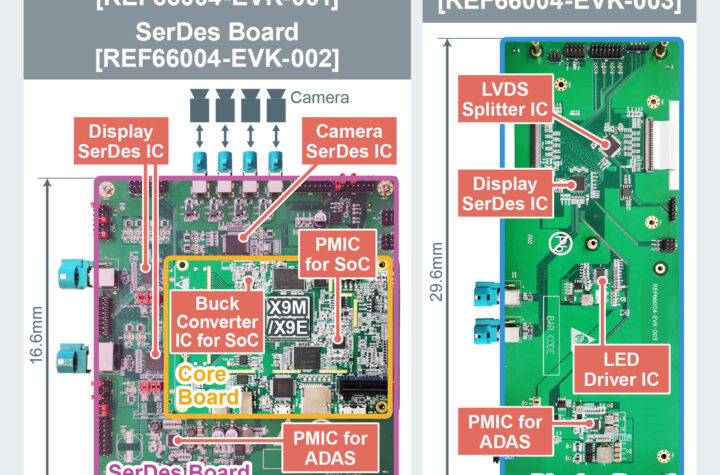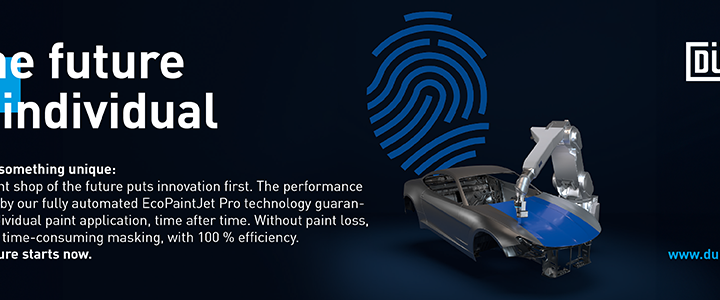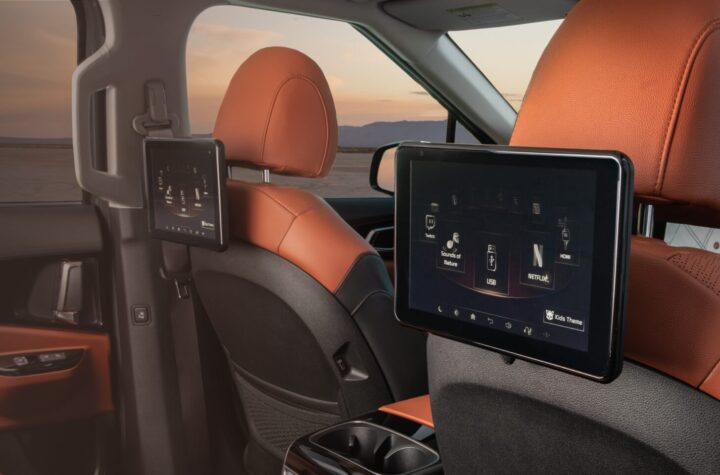Additive manufacturing (AM) is proving to be more than a new way of producing parts – it is changing the mechanics of the automotive industry.
Design and manufacturing teams are having to re-engineer themselves in a world where it no longer takes months and many thousands of dollars to produce a working prototype, or where the cost of low-volume runs cannot be passed on to the market. One of the only companies in the world to fully integrate both the “old” extractive method of series production and the latest AM technology is GKN Powder Metallurgy, which is made up of GKN Sinter Metals and Hoeganaes.
GKN Sinter Metals is the world’s leading manufacturer of precision automotive components as well as components for industrial and consumer applications.
Hoeganaes is one of the world’s largest manufacturers of metal powder, the essential raw material for powder metallurgy. GKN Powder Metallurgy has transformed the way it works internally through the introduction of digital quoting and ordering processes to complement AM. InstAMetal enables customers to order prototypes made by Metal AM online simply by uploading a 3D model. “Our aim is to make the ordering of metal AM prototypes as easy as placing an order on Amazon for our customers. The ordering process is simple and intuitive,” says Peter Oberparleiter, CEO GKN Powder Metallurgy.
Automotive Industries (AI) asked Guido Degen, Senior Vice President Additive Manufacturing and Business Development, GKN Powder Metallurgy, what prospects additive manufacturing offers the auto industry.
Degen: AM really helps with the rapid development of new design concepts and the simplification of sub systems. It helps to substantially reduce lead times for new models. Where with traditional technology it can take months to produce a prototype, we can deliver it within two weeks.
That will help to significantly reduce lead times for new models or design concepts. But, it should be noted that AM is still a very young technology. This means that it still has some issues. For small volume production, it works. For large volume production we are still a bit away, largely because of the costs. In response to the challenge we are working on “High Productivity Processes” that combine high productivity materials with faster AM processing speed to achieve final component properties that better fit the automotive industry’s performance envelope and cost targets. This will open the way for the printing of lightweight applications in series production. This approach is not new to us. The development of high productivity materials and processes is in our DNA. We are the largest component producer in the world. This knowledge is now being transferred to AM production.
AI: Is there a point where traditional manufacturing and AM meet?
Degen: We are positioning ourselves as full metal solution provider. That means we are able to move between the additive and conventional series processes through the lifecycle of a component by combining all metal processes under one roof, which allows us to play to the strengths of each. AM could be used for pre-series development and prototyping. The conventional processes Sinter and MIM are used for high volume, and then towards the end of the product life-cycle we may move back to AM for spares and to reduce the volume of components being warehoused for the aftermarket.
AI: How is Industry 4.0 transforming additive manufacturing?
Degen: We have been using 4.0 processes internally for a number of years. We are digitally well connected to satisfy our 3,000 customers and produce three billion parts a year. A growing portfolio of digital technologies and systems form the foundation of our operational excellence. By adding additive to our process portfolio we are able to improve the time to market and response time drastically. We realized that we needed to create a new system and environment to enable the benefit AM offers. The strength of AM is that you do not need a tool. In theory, you can start printing parts immediately once you have the design. InstAMetal – our instant quoting platform – will tell you whether a part is printable, and give you instant feedback 24 hours a day, wherever you are in the world. In the near future all our printers around the world will be connected to our “printnetwork”, which will automatically allocate a job to a printer. That will bring lead-times down to days instead of months We will continue to challenge ourselves in order to make additive manufacturing more accessible – it needs to be as simple as possible, and it needs to be fast. Flexibility has been built into the back-end to handle the complexity of printing many thousands of pieces. This year we will be introducing a part tracking service which will include all the supporting documentation, such as quality certification. GKN is IATF-certified for automotive components, which is required by the larger OEMs. The objective is for customers to be able to integrate their procurement system into our additive manufacturing system.
AI: How do you secure the intellectual property of your customers?
Degen: The protection of the intellectual property of our customers is a given. Our servers are situated on our premises in order to ensure that we can secure them and the information they contain.
AI: What other applications are there for the automotive sector?
Degen: There is a place for AM already today wherever there is a demand for customization and low volume production. We work with our customers to show them how they can add value using AM technology by hosting experience days at their premises. Issues and challenges are identified, and we work with them to find solutions using AM. This is important because there is a lack of AM-trained engineers around the world. Most engineers have been trained to use subtractive technology. AM requires a different mindset. This is where our partnership with EOS has been very successful. EOS is a global technology and quality leader in high-end AM, offering the systems, material and process parameters used in 3D printing. GKN and EOS jointly host “AM Experience Days”.
AI: What applications there are for new titanium materials such as Beta 21S in automotive manufacturing?
Degen: Beta 21S Titanium is primarily designed for high temperature applications such as in aircraft engines. It may prove useful in testing of new automotive powertrain designs, but it is unlikely to see wide use in automotive at this time. The real opportunity is the use of other titanium alloys that GKN has available where high strength and light weight are needed to improve fuel efficiency.
AI: What are some of the trends you feel will impact automotive manufacturing over the next few years?
Degen: Electrification will rapidly change the way cars are made. Engines and transmission will shrink over time as we move towards a fully electric car. GKN is well placed for all these trends, with a range of driveline systems for hybrids and electric vehicles already in production. The continuous focus on reducing weight will see parts becoming lighter through topology optimization using new manufacturing systems such as AM, and by simplifying production. Then there is the supply chain – the carbon footprint of the whole supply chain from raw materials to recycling at the end of life needs to be reduced. We work with an evolving chain of people, processes and global suppliers to drive down operating costs, implement more effective process solutions and establish standard practices across our global organization.
AI: What about greater use of plastics?
Degen: There are strengths and weaknesses for both plastics and metals. We have converted a plastic adjustment mechanism for steering columns back to metal after the plastic components proved to be unsuitable. There is more and more aluminum being used in cars, and the biggest share of AM metal manufacturing today is held by aluminum.

GKN‘s material capabilities range from high performance gas atomized powders to high productivity water atomized powders.

GKN‘s AM production plants are embedded in Industry 4.0 and backed up by an intelligent global print network, that ensures maximum efficiency and in-time delivery to GKN‘s customers.








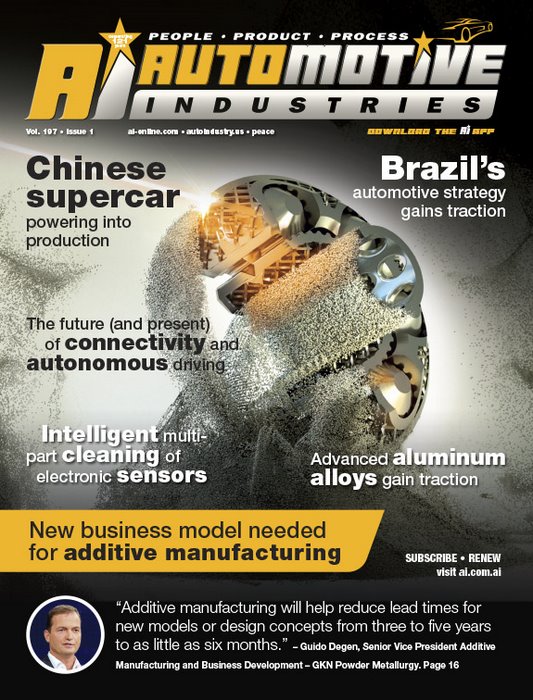





























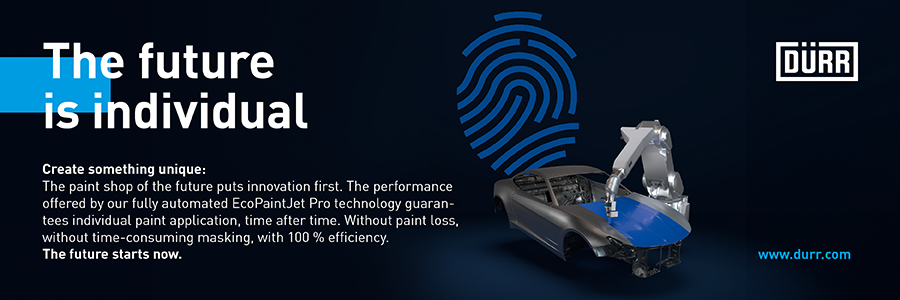








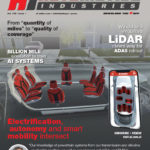 BMW's additive manufacturing journey
BMW's additive manufacturing journey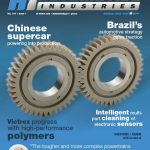 Powertrain: a PEEK into smart solutions
Powertrain: a PEEK into smart solutions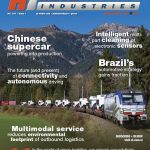 None of which means we have to go back to the Model T. We will end as we started – with a quote: ï
None of which means we have to go back to the Model T. We will end as we started – with a quote: ï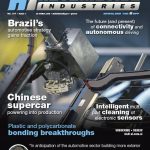 Breakthroughs in bonding and coating enable OEMs to reduce weight by switching to plastic parts
Breakthroughs in bonding and coating enable OEMs to reduce weight by switching to plastic parts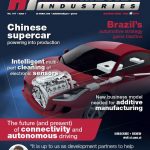 Focus on weight-reduced materials for electro mobility help OEMs keep wheels rolling
Focus on weight-reduced materials for electro mobility help OEMs keep wheels rolling
